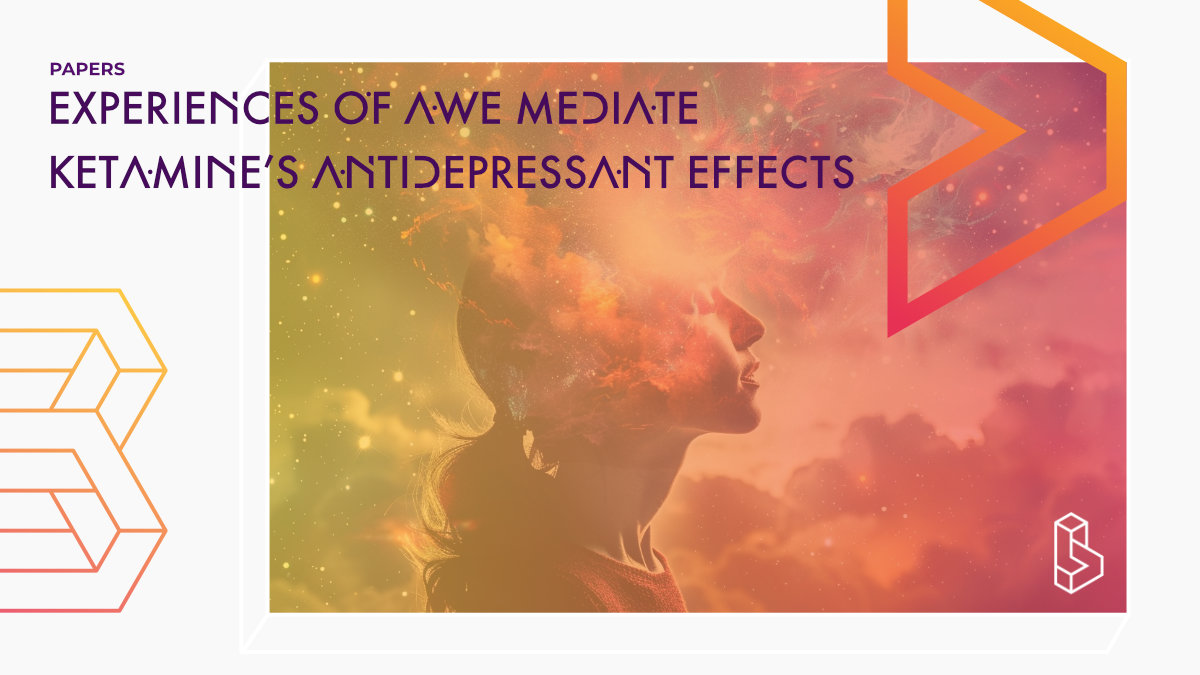This randomized controlled trial (n=116) investigated the psychological mechanisms of ketamine’s antidepressant effects. Participants receiving ketamine reported significantly heightened feelings of awe compared to those receiving a placebo. Awe experiences, as measured by the Awe Experience Scale (AWE-S), mediated depression outcomes (% improvement in MADRS scores) at multiple time points (24 hours and 5, 12, 21, and 30 days) post-infusion, indicating a potential role of awe in ketamine’s therapeutic efficacy for depression.
Abstract of Experiences of Awe Mediate Ketamine’s Antidepressant Effects
“Background: Ketamine, an NMDA receptor antagonist, provides rapid antidepressant effects. Although much research has focused on neural and molecular mechanisms of action, it is critical to also consider psychological mechanisms that may contribute to its therapeutic efficacy. The construct of an awe-inducing experience, which is a well-validated psychological phenomenon tied to emotional well-being, had not been applied previously in ketamine research.
Methods: One hundred sixteen participants with depression, 77 of whom received a ketamine infusion (0.5 mg/kg over 40 minutes) and 39 patients who received saline placebo, completed a validated measure of awe (the Awe Experience Scale [AWE-S]) at 40 minutes postinfusion. AWE-S scores were examined as potential mediators of depression outcomes (% improvement in Montgomery–Åsberg Depression Rating Scale score) at 5 postinfusion time points (24 hours and 5, 12, 21, and 30 days). Dissociative effects, measured by Clinician-Administered Dissociative States Scale scores, were tested in parallel mediation models for comparison.
Results: We found that the psychological experience of awe was strongly reported by participants during ketamine infusion, but not saline infusion, and there were significant associations between total AWE-S scores and Montgomery–Åsberg Depression Rating Scale score improvement (% change) in the ketamine arm at all 5 time points. Furthermore, at all 5 time points, total AWE-S scores statistically mediated the relationship between ketamine and Montgomery–Åsberg Depression Rating Scale scores. By contrast, Clinician-Administered Dissociative States Scale scores did not mediate outcomes at any time point.
Conclusions: Ketamine infusion strongly induced heightened feelings of awe, and these experiences consistently mediated depression outcomes over a 1- to 30-day period, unlike general dissociative side effects. The specific awe-inspiring properties of ketamine may contribute to its antidepressant effects.”
Authors: Julia Aepfelbacher, Benjamin Panny & Rebecca B. Price
Summary of Experiences of Awe Mediate Ketamine’s Antidepressant Effects
Ketamine, an NMDA receptor antagonist, shows great promise for patients with depression but presents safety and feasibility concerns. Esketamine, a Food and Drug Administration – approved ketamine nasal spray, is increasingly used to treat treatment-resistant depression.
Ketamine’s antidepressant mechanisms may be multifactorial and include downstream effects on synaptogenesis, burst firing in lateral habenular circuits, and possible psychedelic or mystical elements. It remains unclear whether these properties similarly play a role in its antidepressant effects.
The Clinician-Administered Dissociative States Scale (CADSS) was initially created to measure dissociation in individuals experiencing psychosis, but it has been adopted to assess dissociative side effects of ketamine. A novel measurement tool, the Awe Experience Scale (AWE-S), may be useful to more sensitively capture the unique experience of ketamine. To examine the potential role of experiencing awe in ketamine’s antidepressant mechanisms of action, we performed statistical mediation analyses.
Find this paper
https://doi.org/10.1016/j.bpsgos.2024.100316
Open Access | Google Scholar | Backup | 🕊
Cite this paper (APA)
Aepfelbacher, J., Panny, B., & Price, R. B. (2024). Experiences of Awe Mediate Ketamine’s Antidepressant Effects: Findings From a Randomized Controlled Trial in Treatment-Resistant Depression. Biological Psychiatry Global Open Science, 4(4), 100316.
Study details
Compounds studied
Ketamine
Placebo
Topics studied
Treatment-Resistant Depression
Depression
Study characteristics
Placebo-Controlled
Double-Blind
Randomized
Participants
116
Humans
Compound Details
The psychedelics given at which dose and how many times
Ketamine 0.5 mg | 1x
